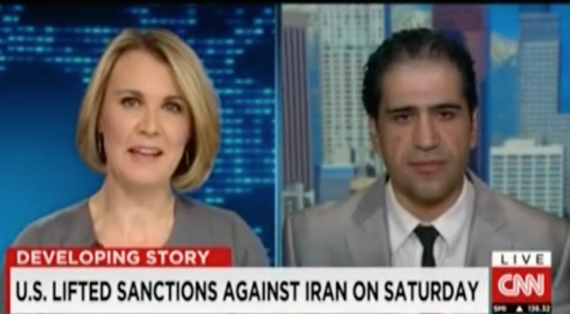The Islamic Republic of Iran has rejected proposals, from members of the Organization of the Petroleum Exporting Countries (OPEC) as well as other major oil-producing countries, to discuss freezing of oil production in order to boost prices and tackle global oil surplus.
Many argued that Iran would become more cooperative after it re-joined the global financial system. Nevertheless, it remains unrealistic to make the argument that Iran will join other heavy-oil suppliers to address low oil prices anytime soon, even though the plunging oil revenues have wreaked havoc on several nations. Iran's politicization of its oil policy affects the global stock market negatively. The uncooperative behavior of the Iranian leaders highlights several crucial issues economically and geopolitically.
Mixing economy, oil policy and politics
Iran's oil policies are not solely driven by economic factors, like other rational state actors, but by geopolitical parameters as well as Tehran's regional hegemonic and ideological ambitions.
When it comes to shaping and controlling oil policy, two major institutions play crucial roles and have the final say in Iran; the office of the supreme leader, Ali Khamenei, and senior officials of Iran's Revolutionary Guard Corps. They hold the monopoly and enjoy significant control over Iran's oil and gas reserves and resources.
First of all, Khamenei and the IRGC do not analyze supply, demand, and inventories in the market in order to adjust their oil output and oil prices. From their perspectives, Iran's military expenditures, its geopolitical and ideological influence in the region, as well as the regional balance of power guide its oil policies.
Secondly, , when it comes to Tehran's oil policy, these main decision-makers do not allow room for maneuvering or cooperation. Other governmental figures, such as the President or foreign ministers, are either not influential or they follow Khamenei's policies.
As a result, for Khamenei and the IRGC leaders, they consider only if their country's defiant attitude of increasing oil production will inflict harm on the economic prowess and national interests of Tehran's regional rivals.
Finally, Iran is not harmed by the current oil prices. Khamenei used to be satisfied with oil at less than $20 a barrel. As long as the oil prices are even at the current low prices, Khamenei and IRGC leaders will be satisfied with the revenues that they are receiving. They are also increasing their output to four millions barrels a day. That would increase Iran's revenue to over 500 percent, in comparison to the time when Iran was under economic sanctions.
Oil and military
Iran's foreign policy is increasingly being defined by the vicious cycle of interaction between soft power and hard power. The soft power in this case is the Islamic Republic's employment of economic and financial prowess to exert its influence the region. The hard power is deploying its military and Qud Forces (branch of IRGC), using proxies for wars, as well as setting up military bases outside Iran for offensive purposes and support of its allies.
As the IRGC military influence and stranglehold is escalating in several countries - including in Syria, Iraq, and Yemen - its need for financial means is increasing. The Islamic Republic is spending billions of dollars every year in order to maintain Bashar al-Assad's power, preserve its military, security and intelligence influence in the Iraqi government, in Lebanon through Hezbollah, in Yemen via the Houthis, and in Bahrain through some Shiite groups.
Thanks to the nuclear agreement, the United Nations Security Council's sanctions relief has finally provided the senior official of the IRGC and the supreme leader, Ali Khamenei, with the required financial means to buttress its military stranglehold across the region. More importantly, with Iran's revenue increasing due to its ramping up of oil exports, the country will invest more in its hard power across the region to tip the balance of power of its favor.
For Iran to become cooperative with other OPEC member and major oil producing nations, the oil prices have to significantly drop even below the current rate. Or, if the regional countries put pressure on Iran through soft power - such as cutting diplomatic ties with Iran - and if they isolate the Iranian leaders, that could also force the Iranian leaders to recalculate their oil policies since geopolitical issues and oil policies are mixed together for them.
Iran views itself as the leader of the Islamic world (not only the Shiites but also the Sunnis). As a result, being isolated by Muslim nations can be more powerful thank economic sanctions - when it comes to trying to change Iran's uncooperative behavior and the shift in its oil and interventionist policies._______________________
Dr. Majid Rafizadeh is an American political scientist, business advisor and the president of the International American Council on the Middle East. Harvard-educated, Rafizadeh serves on the advisory board of Harvard International Review. An American citizen, he is originally from Iran and Syria, lived most of his life in Iran and Syria till recently. He is a board member of several significant and influential international and governmental institutions, and he is native speaker of couple of languages including Arabic and Persian. He also speaks English and Dari, and can converse in French, Hebrew.
You can sign up for Dr. Rafizadeh's newsletter for the latest news and analyses on HERE. You can also order his books on HERE.
You can learn more about Dr. Rafizadeh on HERE.
You can contact him at Dr.rafizadeh@post.harvard.edu or follow him at @Dr_Rafizadeh. This post first appeared on Al Arabiya.

